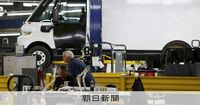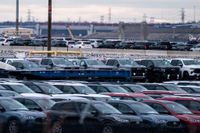On April 15, 2025, Honda's Canadian and Mexican subsidiaries made a clarifying statement regarding their production plans, asserting that there are currently no intentions to shift manufacturing operations to the United States. This announcement came in response to a report by the Nikkei, which suggested that Honda was considering relocating the production of its key models from Mexico and Canada to the U.S. due to tariffs imposed by the Trump administration.
Honda's Canadian subsidiary firmly stated, "No changes are being considered at this time," emphasizing their ongoing review of options for future contingency planning. They mentioned that the company is prepared to utilize short-term production shift strategies as necessary, expressing confidence in navigating the current market environment effectively.
Similarly, Honda's Mexican subsidiary reiterated that there have been no decisions made regarding changes that would affect operations in Mexico. Mexico's Economy Minister, Buenrostro, confirmed via a post on X that Honda executives in Mexico had assured the government of no plans to alter production in the country.
In Canada, Honda's production has been significant, ranking second in the nation for 2024, with a manufacturing plant located in Alliston, Ontario. The company also operates facilities in Guanajuato and Jalisco in Mexico, further solidifying its presence in North America.
On the same day, the Canadian Ministry of Finance announced a partial exemption from automobile tariffs that had been implemented as retaliatory measures against the United States. This exemption is contingent on automobile manufacturers maintaining production in Canada and completing planned investments. If manufacturers were to reduce their investments or production, the number of vehicles eligible for tariff exemption would decrease.
The Canadian government had initiated a 25% retaliatory tariff on U.S.-manufactured automobiles on April 9, 2025, in direct response to similar tariffs imposed by the Trump administration. The recent exemption measure appears aimed at preventing manufacturers from shifting production to the U.S. and ensuring continued investment in Canadian operations.
Prime Minister Chrystia Freeland, during a press conference, stated, "As long as automobile manufacturers continue to produce, employ, and invest in Canada, our retaliatory tariffs will not apply." This statement reflects the government's commitment to supporting domestic production amid growing concerns that manufacturers might withdraw operations from Canada due to U.S. tariffs.
In addition to the automobile tariffs, the Canadian government announced a six-month exemption on tariffs for imports from the U.S. related to food and beverage packaging, health management, and public health. This measure is intended to allow time for the supply chain to stabilize.
Honda's proactive approach in maintaining its production footprint in Canada aligns with the government's efforts to bolster the domestic automotive industry. Last year, Honda unveiled a long-term plan to establish an electric vehicle (EV) supply chain in Canada, with an investment of 15 billion Canadian dollars (approximately 1 trillion 540 billion yen).
Honda's spokesperson reiterated via email that the Alliston plant will continue to operate at full capacity for the foreseeable future, and no modifications to production plans are being considered at this time. The Canadian government is in close contact with Honda, as confirmed by a statement from the office of Industry Minister François-Philippe Champagne, which indicated that there have been no production-related decisions affecting Canadian operations made or contemplated by Honda.
As the automotive industry navigates the complexities of international tariffs and production strategies, Honda's commitment to its Canadian operations stands out as a significant aspect of its overall business strategy. The company's decision to maintain production in Canada not only supports local employment but also aligns with the government's objectives of sustaining domestic manufacturing capabilities.
Furthermore, the implications of these tariff exemptions extend beyond Honda, as they signal a broader strategy by the Canadian government to retain automotive manufacturers within its borders. The balance between competitive pricing and local production is critical, especially as companies like General Motors (GM) and Stellantis continue to export a significant number of vehicles from the U.S. to Canada.
In summary, Honda's recent statements and the Canadian government's tariff exemptions reflect ongoing negotiations and adjustments within the automotive sector. As manufacturers assess their production strategies in light of changing tariffs and economic conditions, the focus remains on maintaining a robust manufacturing presence in Canada while adapting to the evolving market landscape.






